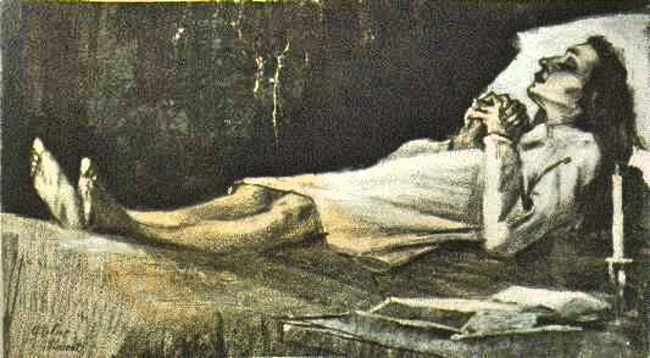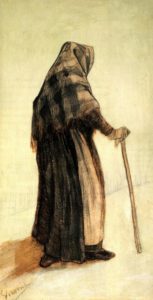King Frederick flashed his old, worried eyes at the queen as they stood beside an ornate wooden bed where the chalky Prince Laverlier lay. The young man’s condition was a mystery to the day’s conventional physicians. The prince had been bled, burned, and poulticed half to death, but, alas, nothing worked. He grew paler each day. Even his hair changed from the once bouncy, golden color to a pallid hue and it stuck, fever-dampened to his face.

The king and queen were so distraught and helpless, they resorted to the alternative methods of an old Hermit-Woman for a possible cure. The queen herself had ridden frantically to the old woman’s hovel and was warmly welcomed with a sweet smile and old, understanding eyes. The woman came the next day. Her unbearably hunched posture was helped along by rough, contorted fingers grasping a tall wooden stick. Her yellow-grey hair often fell in front of her rugged face, hiding clefts of hollow, broadened wrinkles.

The Hermit-Woman was accustomed to being summoned when hope disappeared. Unconventional, to say the least, she put her ear to the lad’s stomach, pinched his inner thigh, flailed her arms near his face, and blew a powder in his eyes. She untied a pouch from her belt, dug in, and withdrew a handful of bones. She took a small bone, pulled one of his pallid hairs, and looped it around. She cast the bones, bent down, and studied them for a while without blinking. Confident she had an answer, she grinned, toothless and sincere, then spoke in crackled tones.
“He needs a real princess,” she creaked. “And feast upon her lifeblood. My little scrying would only reach so far but my eyeing said he’s certainly headed for the death grip. You must procure for him a real princess – and make haste! Only the blood of a real princess will extend the young man’s life.”
The boy’s feverish eyes widened, wild and exaggerated, at the Hermit-Woman’s remedy. The queen was beside herself and demanded to be fanned. King Frederick paced, dumbfounded, wringing his hands. The prince’s expression started to soften once he realized the confidence and severity of her suggestion. His demeanor became more resolved when his eyes viewed her as a compassionate grandmother; and he trusted her. He pushed himself up slowly and eased his body toward the bedside. He stood and his scrawny legs trembled weakly as his feet encountered the floor. He straightened his posture as much as he could, cleared his throat, and said,
“If this is to be my cure, then it will be done, right Father? After all, I could marry her and have assurance of my cure always beside me. She needn’t die, Mother. She could be bled.” He looked kindly at the old woman and said with new found confidence, “I want a real princess.”
The Hermit-Woman licked her lips, took Prince Laverlier’s skeletal hand, pressed it warmly to her, smiled, and said,
“May God bless you, sweet boy.”
Before the old Hermit-Woman turned to leave, she handed the queen another pouch from her belt, and whispered something in her ear. The queen smiled as the old woman humbly bowed and hobbled away.
The journey began throughout the land to find a real princess. Princesses from all the nations arrived for an audience with the royal family but were quickly discounted and summarily shown the door. Each time, Prince Laverlier waved them away. The royal family’s hopes were cut down. Doubt gave way to pure despair when the final princess came forward and was waved away. Like the others, she slumped her rejected shoulders, curtsied with head bowed, and walked out dutifully backwards.
A brutal rain pounded the land that night. Across the wooded valley from King Frederick’s castle, a carriage sped as if on the heels of Hades. A young woman in the carriage was eager to see her grandmother. She opened the instructions given to her. Meet beyond the fork of the road, beyond the wild, toward the lantern lights. Her cerulean eyes looked past the rain, through the hasty scenery, and fixed on faraway thoughts of rejoining her grandmother, whom, she was told would now look after her. Her warm thoughts were suddenly and violently bashed when a powerful blow from the undercarriage forced a break with the horse team. She flung and tossed inside as the carriage rolled down a bald spot of the valley and half-splintered at the bottom. The downpour continued its mischievous pleasure, yet somehow the startled young woman managed to escape from harm. She surveyed her surroundings. In front of her was a fork in the road. She looked beyond the wild and saw the faint blur of what looked like a castle far ahead, and she trudged forward. Perhaps this was the place Grandmother had in mind, she thought.

In the castle, the rain’s drumming gave the prince coveted sleep and allowed the king and queen to reassess the unfortunate circumstance.
“I will not dally with you, my queen. This is bad. We must face this terrible reality. Look, he grows even paler as we stand here. His eyes sink.” The king coughed slightly as he stifled a painful, stabbing cry.
“My king, I still have faith in the Hermit-Woman’s sayings. I will admit it appears hopeless. Go, please, and sleep, my lord. Your cough must be cared for with rest and it bothers me.” He placed his hand atop her own and chuckled.
“Each time the rain comes, I have a cough, my lady,” he lied. “And damp castles rouse such things. Nevertheless, I will do your bidding. I am rather tired.” A thunderous knock joggled the atmosphere and they both startled at the same time.
“Are we to expect anyone? In this rainstorm? It might be a missed princess or perhaps a message. I shall answer the door myself,” said King Frederick.
The king strolled awkwardly down the hall as he stifled a cough. When he stopped at the door, he inhaled deeply and puffed out his chest to present a more powerful appearance. He boldly opened the door and stared down at a young woman’s upturned blue eyes. Her tiny body shivered and her pretty teeth clattered. Her muddy, wet dress clutched her frame and the sludge on her feet looked like small tree trunks. Her tiny voice spoke,
“P…p…p…please, ssssir. M…m…may I warmmmm mysssselfff?”
He wondered how exactly she evaded his guards. She could be a simpleton, a commoner. The king pursed his lips and stroked his chin with his thumb and forefinger. Then again, she might be a real princess and, as the Hermit-Woman counseled, the only chance for the prince’s cure. Several servants’ footsteps approached. He looked down at her beseeching eyes and asked,
“Are you a real princess?”
Her cerulean eyes ballooned like a scolded puppy as she told him she was indeed a real princess.
“What is your name, young lass?”
“Beatrice.”
King Frederick and Beatrice walked through the enormous hallway and into the throne room where a warm fire awaited her. He made sure she was brought a wash basin, some blankets, and clean clothes before he excused himself to inform the queen. The young lady thanked the king, hugged herself, and smiled.
The queen, however, held a healthy suspicion about the girl and called her lady-in-waiting.
“The girl says she is a real princess. We shall see! Accompany me to the guest bedroom in the east.”
In that room, the queen and her lady-in-waiting removed the bed clothes from the bed. Atop the naked bed, the queen carefully placed three magic peas. Then she bade her servants to gather twenty feather beds. By this time, the king was told of the strange happenings and came to see after the queen’s state of mind. The queen pointed to the peas and explained,
“Your majesty, these are magic peas from the Hermit-Woman. If Beatrice is a real princess, she will be battered and bruised from the peas. If she is not, she will be exposed the liar. If proven to be a real princess, she will marry our Prince Laverlier and her blood will spare him. She will be none the wiser.”
Satisfied with the plan, they bade the servants to place each mattress one atop the other, then Beatrice was escorted into the generous room. She looked up and up to the top of the bed, and eyed the queen with a perplexed look. The queen gave her a falsified reason,
“The rain barrels down, young one. Already the valley has begun to fill. You are our guest and our fears of flooding have made it necessary for us to make these accommodations. We all wish you a good night’s sleep.” The queen noticed Beatrice was worn, seemingly anxious, and exhausted from her journey. Her cheeks lacked rosiness and her eyes seemed to be searching quite madly. The queen knew that people behaved strangely when fatigued.
The royal family left her for the evening and the servants gave her a candle with timbers before they exited. She was left all alone. The storm raged and crackles of lightning radiated the room in intervals of shadows and illumination. Beatrice quietly opened the bedroom door and crept out into the hallway.
A servant heard doors along the great hall creak open and groan shut and went to investigate the matter. He studied the corridor and narrowed his eyes as the slight young woman shut the door to Prince Laverlier’s room and tiptoed toward the King’s chamber. The hair on the servant’s neck bristled. He hurried closer.

“Halt young miss! Explain yourself! My lord and lady welcome you generously, yet you creep here and yonder.”
Beatrice stopped short, then turned slow and wary to face him. She trembled, lowered her head, and clasped her hands together.
“Oh, sir! I was in need of asking someone what I should do on the morrow and found myself lost and helpless in this vast castle. Won’t you please take me to my room?” The servant’s suspicion melted. He felt pity for her and escorted her back. She climbed up and up until she flopped atop the bed and immediately slumbered.
As she slept, the first pea slid from beneath the mattress, rolled up and up to Beatrice’s beautiful ear and whispered, “Patience.”
In her sleep, Beatrice found herself standing in line with miles of single filed people. The people looked sick and weary and, with one collected voice they said to her, “Wait here.” She wondered how long she’d been standing there. A wicked little man with a wicked little face said, “Fourteen minutes.” Surely her patience would be rewarded. She shook herself awake and groggily considered the dream, but floated back to sleep.
Not long after, the second pea rolled up and up to Beatrice’s beautiful ear and whispered, “Prudence.”
Once again, she dreamed and glided toward her own castle. Inside the castle, she was greeted by fourteen sickly little servants. She sat and sewed their little clothes, bathed their little bodies and made them little meals. Ever cautious, she made do with their sacrifice. Surely her prudence would be rewarded. She awakened briefly, smiled, and fell back to sleep.
The third pea wriggled free, rolled up and up to Beatrice’s beautiful ear, and whispered, “Perfection.”
In this dream, Beatrice was surrounded by fourteen monsters with fourteen tempting vices. Each encouraged her to eat, eat, eat. They ate gold, swallowed jewels, drank silver and wine. From the darkness, a glutton dangled feasts that stirred a bright queasiness inside her.
She awakened to sunlight introduced by maids and servants pulling back dusty curtains. She was to have breakfast with the royal family, they said. Today was “Servant’s Day,” they said, the day all servants took holiday from afternoon until the morrow. How excited they were! Beatrice passively smiled. They mumbled their concern about her pallor. The lady-in-waiting entered, shushed the servants, eyed the bed, then Beatrice, and hurriedly assisted her with breakfast attire. Beatrice docilely smiled as the lady escorted her downstairs to the dining hall. The queen noticed her puffy eyes, her gaunt-like frame, her pained expression. Maybe she was the real princess! The queen was beside herself, flushed hot with sweat, and demanded to be fanned as she chattered,
“Good morning, my dear! Did sleep treat you kindly?”
“I’m sorry, your majesty. I did not sleep well. I tossed and turned, wandered to and fro, yet I could not be satisfied.” She cupped her hand over her mouth and quickly stood. “If your majesty will please excuse me one moment, I am about to be sick.”
The queen excused her and Beatrice rushed upstairs. The queen was so giddy, she coughed a little in her handkerchief. The Hermit-Woman certainly was wise, she thought. How could they ever repay such advice? At any moment King Frederick and Prince Laverlier would join her and they would offer the marriage proposal. The bloodletting would begin and her son would be saved. Oh, what a wonderful day! She entertained these thoughts for quite some time and did not notice Beatrice had returned to the table.

The queen gasped and coughed. The young woman’s appearance was extraordinary. Rosy cheeks upon a full porcelain face, smiling, bright eyes, a faint flushed color drifted from her neck and breasts.
“Y-you look . . . better,” the queen noted.
“Thank you, your majesty. It usually takes a little while. Mornings are the worst.”
The queen was quite puzzled, but dismissed it, saying,
“Well, my dear. His majesty and the prince will be joining us soon. I must confess I am unable to wait out the tortuous time! I must tell you now! We are certain you are a real princess. Prince Laverlier has been looking to marry for quite some time now. You, my dear, are that woman. You will marry the prince and stay here with us,” decided the queen. Beatrice lowered her head, dabbed her mouth with a linen napkin, and said,
“I’m afraid that cannot be, your majesty.”
The queen caught her breath and wheezed.
“My dear!” she exclaimed. “Were the servants unkind? Have we displeased you in any way? If it’s a question of homesickness, your family is welcome. In time, you may like to visit them. My daughter, why do you reject this?”
Beatrice daintily folded the napkin and met the queen’s eyes.
“Because, your majesty, the prince is quite dead. The king, too. You see, I was born with an unfortunate condition. I came here to find my grandmother who will take care of my condition and me. Everyone must eat, of course. Some eat stranger things than do others. Me? I feed off the truly sick – the infirmed and the diseased. The longer time between feedings weakens me so I must keep myself nourished. Grandmother sent me a message and carriage. The carriage met misfortune, yet I arrived at the exact place she imparted. She wrote about a bag of magic peas and told me they would inspire three dreams and expose who was truly sick. I’m much better – as you see.”
The queen yelled for the servants to search the rooms and grounds for the king and the prince. No servants came. They’d all departed for their special holiday.
“How? How can this be? You were to be for my son! You said you were a real princess! You passed the test! The Hermit-Woman said . . . the . . . Hermit . . .” The queen stumbled her words and coughed.
“Oh . . . I am a real princess, your majesty. I am Princess Beatrice and my mother was Queen Nora of the Feeders. My Grandmother is the greatest Sage our land has ever known. It seems you have indeed been introduced.”

“Now you have told it all to me, you wicked girl! You shall pay! My rage will strengthen me to bind you until the servants arrive. I am still alive! I am still alive!”
Princess Beatrice displayed a calculating grin.
“Ah . . . but I have left my work undone,” she said. She stood and strolled toward the queen, sniffed her aura, then smiled. “Ah . . . tuberculosis . . . The sweetness of that blood is to die for.”

Beatrice’s blue eyes glowed and the queen saw the grisly, ghastly teeth and heard the long hiss of her fate before darkness mercifully enclosed her. Beatrice left not a drop, not a piece, not a shred of her food. She sat with a content stomach and allowed the queen to digest. She caught the movement of the massive front door and heard it screech slowly open. Her heart pounded. Her blood thumped. She raced to embrace the Hermit-Woman who walked just inside the door.
“Your peas were right, Grandmother. I feasted all night, though in increments. In the morning, I was rewarded for my patience. It took fourteen minutes for the fourteen prudent servants to leave and it took fourteen minutes to consume a perfect breakfast – with a delicious, tubercular supplement.” She planted a happy kiss upon the Hermit-Woman’s cheek. “Shall we gather the poor, old peas, Grandmother?”
“Leave the peas here, my treasure. I have many things to teach you, Granddaughter, but now we must move on to the next meal.”
**Featured Image by Willgard Krause on Pixabay
